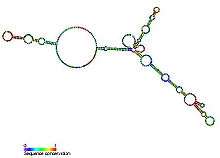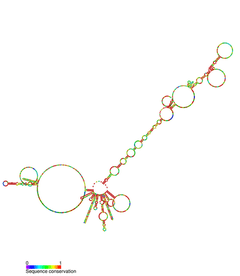Telomerase RNA component
Telomerase RNA component, also known as TERC, is an ncRNA found in eukaryotes, that is a component of telomerase - The enzyme used to extend telomeres.[2][3] TERC serves as a template for telomere replication (reverse transcription) by telomerase. Telomerase RNAs differ greatly in sequence and structure between vertebrates, ciliates and yeasts, but they share a 5' pseudoknot structure close to the template sequence. The vertebrate telomerase RNAs have a 3' H/ACA snoRNA-like domain.[4][5][6]
Function
Telomerase is a ribonucleoprotein polymerase that maintains telomere ends by addition of the telomere repeat TTAGGG. This repeat does vary across eukaryotes (see the table on the telomere article for a complete list). The enzyme consists of a protein component (TERT) with reverse transcriptase activity, and an RNA component, encoded by this gene, that serves as a template for the telomere repeat. CCCUAA found near position 50 of the vertebrate TERC sequence acts as the template. Telomerase expression plays a role in cellular senescence, as it is normally repressed in postnatal somatic cells resulting in progressive shortening of telomeres. Deregulation of telomerase expression in somatic cells may be involved in oncogenesis. Studies in mouse suggest that telomerase also participates in chromosomal repair, since de novo synthesis of telomere repeats may occur at double-stranded breaks.[7] Homologs of TERC can also be found in the Gallid herpes viruses.[8]
Clinical significance
Mutations in this gene cause autosomal dominant dyskeratosis congenita, and may also be associated with some cases of aplastic anemia.[7]
References
- ↑ "Human PubMed Reference:".
- ↑ Feng J, Funk WD, Wang SS, Weinrich SL, Avilion AA, Chiu CP, Adams RR, Chang E, Allsopp RC, Yu J (September 1995). "The RNA component of human telomerase". Science. 269 (5228): 1236–41. doi:10.1126/science.7544491. PMID 7544491.
- ↑ Jády BE, Richard P, Bertrand E, Kiss T (February 2006). "Cell Cycle-dependent Recruitment of Telomerase RNA and Cajal Bodies to Human Telomeres". Mol. Biol. Cell. 17 (2): 944–54. doi:10.1091/mbc.E05-09-0904. PMC 1356602
 . PMID 16319170.
. PMID 16319170. - ↑ McCormick-Graham, M; Romero DP (1995). "Ciliate telomerase RNA structural features". Nucleic Acids Res. 23 (7): 1091–1097. doi:10.1093/nar/23.7.1091. PMC 306816
 . PMID 7739888.
. PMID 7739888. - ↑ Lingner, J; Hendrick LL; Cech TR (1994). "Telomerase RNAs of different ciliates have a common secondary structure and a permuted template". Genes Dev. 8 (16): 1984–1998. doi:10.1101/gad.8.16.1984. PMID 7958872.
- ↑ Theimer CA, Feigon J (2006). "Structure and function of telomerase RNA". Curr. Opin. Struct. Biol. 16 (3): 307–18. doi:10.1016/j.sbi.2006.05.005. PMID 16713250.
- 1 2 "Entrez Gene: TERC telomerase RNA component".
- ↑ Fragnet, L; Kut E; Rasschaert D (2005). "Comparative functional study of the viral telomerase RNA based on natural mutations". J Biol Chem. 280 (25): 23502–23515. doi:10.1074/jbc.M501163200. PMID 15811851.
Further reading
- de Lange T, Jacks T (1999). "For better or worse? Telomerase inhibition and cancer". Cell. 98 (3): 273–5. doi:10.1016/S0092-8674(00)81955-8. PMID 10458601.
- Marrone A, Dokal I (2007). "Dyskeratosis congenita: molecular insights into telomerase function, ageing and cancer". Expert Reviews in Molecular Medicine. 6 (26): 1–23. doi:10.1017/S1462399404008671. PMID 15613268.
- Yamaguchi H (2007). "Mutations of telomerase complex genes linked to bone marrow failures". Journal of Nippon Medical School = Nihon Ika Daigaku zasshi. 74 (3): 202–9. doi:10.1272/jnms.74.202. PMID 17625368.
- Zaug AJ, Linger J, Cech TR (1996). "Method for determining RNA 3' ends and application to human telomerase RNA". Nucleic Acids Res. 24 (3): 532–3. doi:10.1093/nar/24.3.532. PMC 145649
 . PMID 8602368.
. PMID 8602368.
- Soder AI, Hoare SF, Muire S, et al. (1997). "Mapping of the gene for the mouse telomerase RNA component, Terc, to chromosome 3 by fluorescence in situ hybridization and mouse chromosome painting". Genomics. 41 (2): 293–4. doi:10.1006/geno.1997.4621. PMID 9143511.
- Zhao JQ, Hoare SF, McFarlane R, et al. (1998). "Cloning and characterization of human and mouse telomerase RNA gene promoter sequences". Oncogene. 16 (10): 1345–50. doi:10.1038/sj.onc.1201892. PMID 9546436.
- Mitchell JR, Wood E, Collins K (1999). "A telomerase component is defective in the human disease dyskeratosis congenita". Nature. 402 (6761): 551–5. doi:10.1038/990141. PMID 10591218.
- Chen JL, Blasco MA, Greider CW (2000). "Secondary structure of vertebrate telomerase RNA". Cell. 100 (5): 503–14. doi:10.1016/S0092-8674(00)80687-X. PMID 10721988.
- Wong KK, Chang S, Weiler SR, et al. (2000). "Telomere dysfunction impairs DNA repair and enhances sensitivity to ionizing radiation". Nat. Genet. 26 (1): 85–8. doi:10.1038/79232. PMID 10973255.
- Mitchell JR, Collins K (2000). "Human telomerase activation requires two independent interactions between telomerase RNA and telomerase reverse transcriptase". Mol. Cell. 6 (2): 361–71. doi:10.1016/S1097-2765(00)00036-8. PMID 10983983.
- Imoto I, Pimkhaokham A, Fukuda Y, et al. (2001). "SNO is a probable target for gene amplification at 3q26 in squamous-cell carcinomas of the esophagus". Biochem. Biophys. Res. Commun. 286 (3): 559–65. doi:10.1006/bbrc.2001.5428. PMID 11511096.
- Vulliamy T, Marrone A, Goldman F, et al. (2001). "The RNA component of telomerase is mutated in autosomal dominant dyskeratosis congenita". Nature. 413 (6854): 432–5. doi:10.1038/35096585. PMID 11574891.
- Pruzan R, Pongracz K, Gietzen K, et al. (2002). "Allosteric inhibitors of telomerase: oligonucleotide N3′→P5′ phosphoramidates". Nucleic Acids Res. 30 (2): 559–68. doi:10.1093/nar/30.2.559. PMC 99832
 . PMID 11788719.
. PMID 11788719.
- Zhang RG, Zhang RP, Wang XW, Xie H (2004). "Effects of cisplatin on telomerase activity and telomere length in BEL-7404 human hepatoma cells". Cell Res. 12 (1): 55–62. doi:10.1038/sj.cr.7290110. PMID 11942411.
- Yang Y, Chen Y, Zhang C, et al. (2002). "Nucleolar localization of hTERT protein is associated with telomerase function". Exp. Cell Res. 277 (2): 201–9. doi:10.1006/excr.2002.5541. PMID 12083802.
- Chang JT, Chen YL, Yang HT, et al. (2002). "Differential regulation of telomerase activity by six telomerase subunits". Eur. J. Biochem. 269 (14): 3442–50. doi:10.1046/j.1432-1033.2002.03025.x. PMID 12135483.
- Gavory G, Farrow M, Balasubramanian S (2002). "Minimum length requirement of the alignment domain of human telomerase RNA to sustain catalytic activity in vitro". Nucleic Acids Res. 30 (20): 4470–80. doi:10.1093/nar/gkf575. PMC 137139
 . PMID 12384594.
. PMID 12384594.
- Sood AK, Coffin J, Jabbari S, et al. (2003). "p53 null mutations are associated with a telomerase negative phenotype in ovarian carcinoma". Cancer Biol. Ther. 1 (5): 511–7. doi:10.4161/cbt.1.5.167. PMID 12496479.
- Antal, M; Boros E; Solymosy F; Kiss T (2002). "Analysis of the structure of human telomerase RNA in vivo". Nucleic Acids Res. 30 (4): 912–920. doi:10.1093/nar/30.4.912. PMC 100349
 . PMID 11842102.
. PMID 11842102.
External links




 . PMID 16319170.
. PMID 16319170. . PMID 7739888.
. PMID 7739888. . PMID 8602368.
. PMID 8602368. . PMID 11788719.
. PMID 11788719. . PMID 12384594.
. PMID 12384594. . PMID 11842102.
. PMID 11842102.